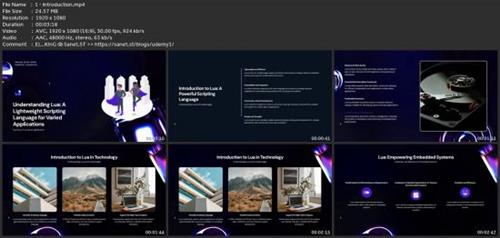Lua: Programming From Zero To Hero

Published 4/2024
MP4 | Video: h264, 1920x1080 | Audio: AAC, 44.1 KHz
Language: English | Size: 506.25 MB | Duration: 2h 9m
Master the Art of Lua Scripting: From Fundamental Concepts to Advanced Development
What you'll learn
Lua Syntax and Basics: Understanding the fundamental syntax and constructs of Lua, such as variables, data types, and operators.
Control Structures: Learning how to use conditional statements and loops to control the flow of the program.
Functions: Defining and invoking functions to create reusable code blocks and manage code complexity.
Tables: Working with Lua's primary data structure for organizing and storing data.
Modules and Packages: Organizing code into modules and using packages to extend Lua's capabilities.
Error Handling: Implementing error handling and debugging techniques to create robust Lua applications.
File I/O: Reading from and writing to files to handle data persistence.
Metatables and Metamethods: Using advanced features of Lua to customize the behavior of tables.
Coroutines: Understanding and utilizing coroutines for cooperative multitasking.
Lua in Embedded Systems: Exploring how Lua is used in embedded systems and game development.
Best Practices: Learning the best practices for writing clean, efficient, and maintainable Lua code.
Requirements
No programming experience is needed. You will learn everything you need to know.
Description
In this course, you will learn Lua: Programming From Zero to Hero, Lua is a lightweight, high-level, multi-paradigm programming language designed primarily for embedded use in applications. It is cross-platform, as its interpreter of compiled bytecode is written in ANSI C, making it highly portable. Lua is known for its simple procedural syntax with powerful data description constructs based on associative arrays and extensible semantics. It supports procedural programming, object-oriented programming, functional programming, data-driven programming, and data description. Lua is dynamically typed, runs by interpreting bytecode with a register-based virtual machine, and has automatic memory management with incremental garbage collection, which makes it ideal for configuration, scripting, and rapid prototypingLua Syntax and Basics: Understanding the fundamental syntax and constructs of Lua, such as variables, data types, and operators.Control Structures: Learning how to use conditional statements and loops to control the flow of the program.Functions: Defining and invoking functions to create reusable code blocks and manage code complexity.Tables: Working with Lua's primary data structure for organizing and storing data.Modules and Packages: Organizing code into modules and using packages to extend Lua's capabilities.Error Handling: Implementing error handling and debugging techniques to create robust Lua applications.File I/O: Reading from and writing to files to handle data persistence.Metatables and Metamethods: Using advanced features of Lua to customize the behavior of tables.Coroutines: Understanding and utilizing coroutines for cooperative multitasking.Lua in Embedded Systems: Exploring how Lua is used in embedded systems and game development.Best Practices: Learning the best practices for writing clean, efficient, and maintainable Lua code.Remember to structure your course content in a way that gradually introduces new concepts, provides plenty of examples, and encourages hands-on practice. Good luck with your course!
Overview
Section 1: Introduction
Lecture 1 Introduction
Lecture 2 About Me
Lecture 3 Making the Best Use of This Course
Section 2: Lua Programming
Lecture 4 Installing Lua
Lecture 5 Hello World in Lua
Lecture 6 Data Types in Lua
Lecture 7 Comments in Lua
Lecture 8 Variables in Lua
Lecture 9 Strings in Lua
Lecture 10 Math in Lua
Lecture 11 If Else in Lua
Lecture 12 Loops in Lua
Lecture 13 User Input in Lua
Lecture 14 Tables in Lua
Lecture 15 OS in Lua
Lecture 16 Functions in Lua
Lecture 17 FileHandling in Lua
Lecture 18 CustomModule in Lua
Lecture 19 OOP in Lua
Lecture 20 Co-Routines in Lua
Lecture 21 Metamethods in Lua
Lecture 22 What next
Section 3: Conclusion
Lecture 23 Conclusion
Lua Programmers,Beginners with no prior programming experience,Programmers with experience in other languages,Game developers,Students,Software developers,Machine learning engineers: Those who might use Lua in the context of Torch, a machine learning library that uses LuaJIT
Screenshots

rapidgator.net:
https://rapidgator.net/file/75e19dc732aaef6396a882b9197934d0/ncmuh.Lua.Programming.From.Zero.To.Hero.rar.html
nitroflare.com:
https://nitroflare.com/view/90E9B07201F17C8/ncmuh.Lua.Programming.From.Zero.To.Hero.rar